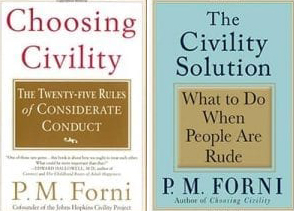Johns Hopkins lost a treasured faculty member earlier this month; it is a loss felt far beyond the borders of our campus. Pier Massimo Forni was renowned in academia for his scholarship in the field of Italian literature (he taught Dante and Boccaccio), and more broadly for his work on the history and theory of civility. P.M. Forni was a personal friend as well as a contributor to the Innovative Instructor print article series. He was also the inspiration for Innovative Instructor blog posts on civil behavior in the classroom and the concept of creating a contract with your students (Tips for Regulating the Use of Mobile Devices in the Classroom, October 12, 2012).
 Dr. Forni was the co-founder of the Johns Hopkins Civility Project (JHCP): “An aggregation of academic and community outreach activities, the JHCP aimed at assessing the significance of civility, manners and politeness in contemporary society.” JHCP became the Civility Initiative, which Dr. Forni directed. As his obituary in the New York Times (Neil Genzlinger, December 7, 2018) noted: “Civility, to Dr. Forni, was not just a matter of learning and observing rules of good manners. It was something with very real consequences. Civility means less stress, which has advantages like improved health, safer driving and more productivity at work.”
Dr. Forni was the co-founder of the Johns Hopkins Civility Project (JHCP): “An aggregation of academic and community outreach activities, the JHCP aimed at assessing the significance of civility, manners and politeness in contemporary society.” JHCP became the Civility Initiative, which Dr. Forni directed. As his obituary in the New York Times (Neil Genzlinger, December 7, 2018) noted: “Civility, to Dr. Forni, was not just a matter of learning and observing rules of good manners. It was something with very real consequences. Civility means less stress, which has advantages like improved health, safer driving and more productivity at work.”
He authored two books on civility: Choosing Civility: The Twenty-Five Rules of Considerate Conduct (St. Martin’s Press, 2002), and The Civility Solution: What to Do When People Are Rude (St. Martin’s Press, 2009). The first book examines the tenants of thoughtful and effective connections with others; the second offers concrete suggestions for dealing with rudeness. If you have not read these books, I highly recommend them as an antidote for the increasing incivility we are encountering in our society today. Moreover, you will find them useful for establishing a climate of civility, respect, and inclusion in your classroom.
It was in the classroom that Dr. Forni had the revelation that sparked his interest in the history, theory, and practice of civility. From the New York Times obituary (as Dr. Forni recalls in “Choosing Civility): “One day, while lecturing on the Divine Comedy, I looked at my students and realized that I wanted them to be kind human beings more than I wanted them to know about Dante,” he wrote. “I told them that if they knew everything about Dante and then they went out and treated an elderly lady on the bus unkindly, I’d feel that I had failed as a teacher.”
P.M. Forni wrote two Innovative Instructor print articles for us. In Civility in the Classroom (September 2010) he recommends establishing a climate of relaxed formality, training students to distinguish the trivial from the valuable, selling your product (the topic of your course) and yourself (as a teacher), and stipulating a fair covenant. Creating a Covenant with Your Students (November 2009) expands on the idea of the covenant—essentially a contract that you and your students agree to abide by that clearly stipulates what the students can expect from you and what you as the instructor expect from them.
Johns Hopkins and the world have lost a gentle soul. In this holiday season, I hope that all of us will reflect on the virtues of civil behavior and resolve to do as P.M. Forni would do.
Macie Hall, Senior Instructional Designer
Center for Educational Resources
Image Source: book covers https://grll.jhu.edu/directory/pier-massimo-forni/

This is a lovely testimonial to Dr. Forni, Macie. Thank you for eloquently capturing even a tiny portion of his impact on the world that we all co-inhabit.
Thank you, Candice.